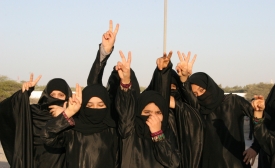iran
Iranian-born composer Reza Vali, a Carnegie Mellon University music professor, will travel to Iran with the Carpe Diem String Quartet of Ohio for the Fajr International Music Festival in February 2016.

Javad Rad says the U.S. is "betting on the wrong horse" in the Middle East.
With the United States and Iran currently negotiating a nuclear deal under which those sanctions would eventually be lifted, some American companies are now hoping for new business opportunities in a country that has long been off limits.
In 2002, Benjamin Netanyahu declared during a US congressional hearing that "there is no doubt" that Iraq had weapons of mass destruction and that the way to solve the Iraqi threat was by toppling Saddam Hussein's regime. Toppling the Saddam regime, Netanyahu predicted, would have tremendous positive regional consequences: The region's nations would rise up against their tyrannical rulers and the Iranian regime would be undermined or would collapse.As we all know, what ended up happening was different.
Last week’s unanimous vote by the Senate Foreign Relations Committee on legislation allowing congressional oversight of a potential nuclear deal with Iran has been interpreted by some as a setback to President Obama. The opposite is the case. The fact is that the president’s patient and intricate diplomatic approach, along with other major world powers, to negotiating this historic agreement has gained real traction and it now seems highly unlikely that opponents of the deal could sabotage it through congressional action.
Seoul is an increasingly active player in the Middle East. Relying almost entirely on foreign oil imports, South Korea is economically disposed to chart a delicate political course between its suppliers in Iran and the Gulf.
Tehran faces a classic case of mission creep: It is being forced to commit ever-greater military and financial resources in Syria, falling deeper into the Syrian quagmire with no clear exit strategy. After four years of war, Assad’s forces are overstretched, the regime’s Alawite base is demoralized, and the Syrian economy is in a free-fall.
Sanctions have become as sacred to western armouries as nuclear bombs were 50 years ago. No one dares question them for fear of being thought a dove or a wimp. They cost little to the aggressor but make them feel good. They repress trade rivals. They attract macho adjectives, such as tough, meaningful, targeted and smart. They are chiefly aimed at domestic consumption. Only the poor (and a handful of rich) in the victim states suffer.







